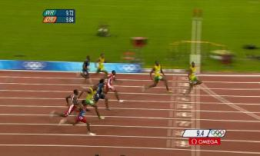September 11, 2008 feature
Physicists estimate how fast Usain Bolt could have run

(PhysOrg.com) -- By the record books, Jamaican runner Usain Bolt is the fastest human being on earth, and yet no one knows for sure exactly how fast he really is. At the Beijing 2008 Olympics, on Saturday, August 16th, Bolt broke his own world record (9.72 seconds) with a time of 9.69 seconds in the 100-meter dash. But with 20 meters remaining, the 21-year-old looked around, and, when realizing he had a strong lead, he started celebrating before he crossed the finish line.
After watching this jaw-dropping behavior, many people have wondered what Bolt’s time would have been – i.e., what the fastest time ever run by a human could have been – if he had raced the entire way.
Among the curious fans is a team of physicists from the University of Oslo led by Hans Kristian Eriksen, who has recently predicted Bolt’s hypothetical world record based on factors such as his acceleration and velocity. By extrapolating from Bolt’s speed before celebrating, the physicists estimated that the new world record would have been about 9.55 ± 0.04 seconds.
Their estimate would support the claim of Bolt’s coach, Glen Mills, who suggested at a recent press conference that the time could have been 9.52 seconds or better.
“It all started with an interview with Usain Bolt's coach published in the general media before a Golden League competition in Zurich,” Eriksen told PhysOrg.com, adding that he and his co-authors all share a general interest in sports. “He claimed that Bolt was on track for a 9.52-second record, had he not slowed down. Then it struck us that, given reasonable video footage of the race and some assumptions about his acceleration, it should be possible to ‘calculate’ what that time would have been.”
To arrive at their estimate, the Norwegian scientists analyzed different videos of the race from NBC, the BBC, and the Norwegian Broadcasting Company (NRK). A moving camera positioned on a rail along the race track served as a standard ruler, since the scientists could count the evenly spaced bolts on the rail to track the distance and align these ticks with the runners’ positions.
The scientists made two estimates based on different assumptions. The first and more conservative estimate assumed that Bolt could have maintained runner-up Richard Thompson’s acceleration during the end of the race. The second estimate assumed that Bolt could have maintained an acceleration 0.5 m/s2 faster than Thompson.
Based on their recording of Bolt’s and Thompson’s positions at the times they passed the ticks on the rail, the researchers determined an approximation of the runners’ positions as a function of time, as well as their speeds and accelerations.
By extrapolating these trajectories to 100 meters, the scientists got their results. If Bolt had maintained Thompson’s acceleration, his time would have been 9.61 ± 0.04 seconds. If Bolt had maintained an acceleration 0.5 m/s2 faster than Thompson, his time would have been 9.55 ± 0.04 seconds.
“For fun, we thought we might as well post the study on astro-ph, an archive for astrophysicists, more or less as an internal joke in the community,” Eriksen said. “However, when we started writing, we suddenly realized that this might actually be interesting and useful to more people than the originally intended audience, and we shifted to a semi-serious approach, and wrote up a ‘real’ paper. In particular, we figured this could be an interesting example of simple physics for educational and outreach purposes, and we therefore submitted the paper to the American Journal of Physics.”
As Eriksen emphasized, this study is a piece of “fun physics,” and its conclusions should not be regarded too seriously. The physicists explained that their estimates of Bolt’s potential time have a 95% error (± 0.04 seconds), but the uncertainties due to the assumptions on Bolt’s acceleration are at least as large as the statistical uncertainties. For instance, the physicists had to calibrate measurements regarding missing ticks on the rail, the precision of the screen clock, and the difference between the screen and stadium clocks.
Another potential uncertainty is the possibility that Bolt may have been tired at the end. (However, as the scientists note from an admittedly subjective perspective, “judging from his facial expressions as he crossed the finishing line, this doesn’t immediately strike us as a very plausible hypothesis.”)
Wind speed is another factor, although the measured wind speed on the track during the Beijing race was negligible. But the physicists noted that favorable wind conditions, such as a 2 m/s wind speed, could decrease the time by as much as 0.1 seconds. With these results in mind, they suggest that Bolt is capable of setting a new world record of less than 9.5 seconds in the near future – but they still reserve some scientific caution.
“I should also say that this study is really pretty much useless for actually predicting the new world record,” said Eriksen. “Taking into account both uncertainties due to assumptions and measuring errors, a proper 95% confidence interval is something like 9.51 to 9.65 seconds – and that's something most people could have guessed very easily. However, the main point is that this is a fun example of simple physics that is interesting to many people. So its main purpose is really for popularizing physics – not to define a new world record. That being said, we do believe that the methods we use are appropriate, and with better data we could have done a lot better.”
More information: Eriksen, H. K.; Kristiansen, J. R.; Langangen, O.; and Wehus, I. K. “Velocity dispersions in a cluster of stars: How fast could Usain Bolt have run?” arxiv:0809.0209v2. Submitted for publication in the American Journal of Physics.
Copyright 2008 PhysOrg.com.
All rights reserved. This material may not be published, broadcast, rewritten or redistributed in whole or part without the express written permission of PhysOrg.com





















